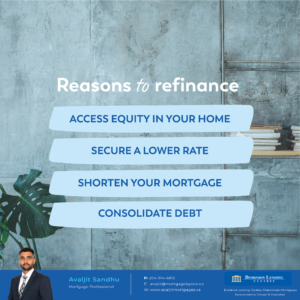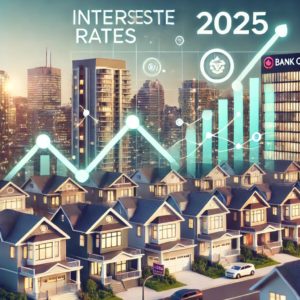When Does Refinancing Make Sense?
Mortgage refinancing is the process of replacing your existing mortgage with a new one, often with different terms and interest rates. Homeowners refinance for various reasons, such as lowering their interest rate, reducing monthly payments, consolidating debt, or accessing home equity.
Refinancing makes sense if:
- You can secure a lower interest rate, reducing overall interest costs.
- You need to consolidate high-interest debts into a lower mortgage rate.
- Your home’s value has increased, allowing you to access home equity.
- You want to switch from a variable to a fixed-rate mortgage for stability.
- You wish to change your mortgage term to suit your financial goals.
Costs & Considerations
While refinancing can be beneficial, it comes with costs and considerations:
- Prepayment Penalties – Some lenders charge penalties for breaking an existing mortgage early.
- Legal Fees – A lawyer is needed to finalize the new mortgage.
- Appraisal Fees – Lenders may require a home appraisal to determine its current market value.
- New Mortgage Terms – Ensure the new mortgage aligns with your long-term financial plans.
Difference Between Renewal & Refinance
- Renewal happens at the end of your mortgage term, allowing you to negotiate a new rate with the same lender or switch lenders without breaking your mortgage.
- Refinancing involves replacing your current mortgage before its term ends, often requiring additional costs but providing financial benefits like lower interest rates or debt consolidation.
Process & Timeline
- Assess Your Financial Goals – Determine why you want to refinance.
- Check Your Credit Score – A good credit score improves your chances of securing a better rate.
- Evaluate Your Home Equity – Lenders may allow you to borrow up to 80% of your home’s value.
- Compare Lenders & Mortgage Rates – Look at options from different financial institutions.
- Apply for a New Mortgage – Submit your financial documents, such as income proof and bank statements.
- Approval & Appraisal – The lender assesses your eligibility and may require a property appraisal.
- Closing the Loan – Once approved, your lawyer finalizes the new mortgage agreement.
Is Refinancing Right for You?
Refinancing is ideal if it aligns with your financial needs and goals. If you need lower payments, better interest rates, or debt consolidation, refinancing may be the right choice. However, consider all costs before proceeding.
How Refinance Mortgage Works
When you refinance, the new lender pays off your old mortgage, and you start a new loan agreement. Your monthly payments, interest rate, and loan term change based on the new mortgage terms.
When to Refinance Mortgage
- When interest rates drop significantly.
- When your credit score improves.
- When your home equity has increased.
- When you need to consolidate debt.
- When you want to switch from a variable to a fixed rate.
Refinance When Home Value Increases
If your home’s value has risen, you may qualify for a larger loan, allowing you to access equity for renovations, investments, or other financial needs.
Why Refinance Your Mortgage
Refinancing allows you to:
- Reduce your interest rate and monthly payments.
- Consolidate debt into a single, lower-interest loan.
- Access home equity for investments, renovations, or other expenses.
- Adjust your mortgage term to match your financial goals.
FAQ: Mortgage Refinancing
Q: How long does the refinancing process take? A: Typically, 2 to 4 weeks, depending on the lender and required documentation.
Q: Can I refinance with bad credit? A: Yes, but your interest rate may be higher. Improving your credit score can help secure better rates.
Q: What documents are needed for refinancing? A: Proof of income, bank statements, property details, and a credit check.
Q: How much equity do I need to refinance? A: Most lenders require at least 20% equity in your home.
FAQ: Avaljit Sandhu – Dominion Lending Centres Mainstream Mortgages
Q: Who is Avaljit Sandhu? A: Avaljit Sandhu is a mortgage professional at Dominion Lending Centres Mainstream Mortgages, helping clients secure mortgage financing in Winnipeg, Manitoba.
Q: What services does Avaljit Sandhu offer? A: Mortgage refinancing, first-time homebuyer mortgages, debt consolidation, and home equity loans.
Q: How can I contact Avaljit Sandhu? A: You can reach out through Dominion Lending Centres Mainstream Mortgages for expert mortgage advice and refinancing assistance.
If you’re considering mortgage refinancing, contact Avaljit Sandhu at Dominion Lending Centres Mainstream Mortgages to explore your options and make the right financial decision.




